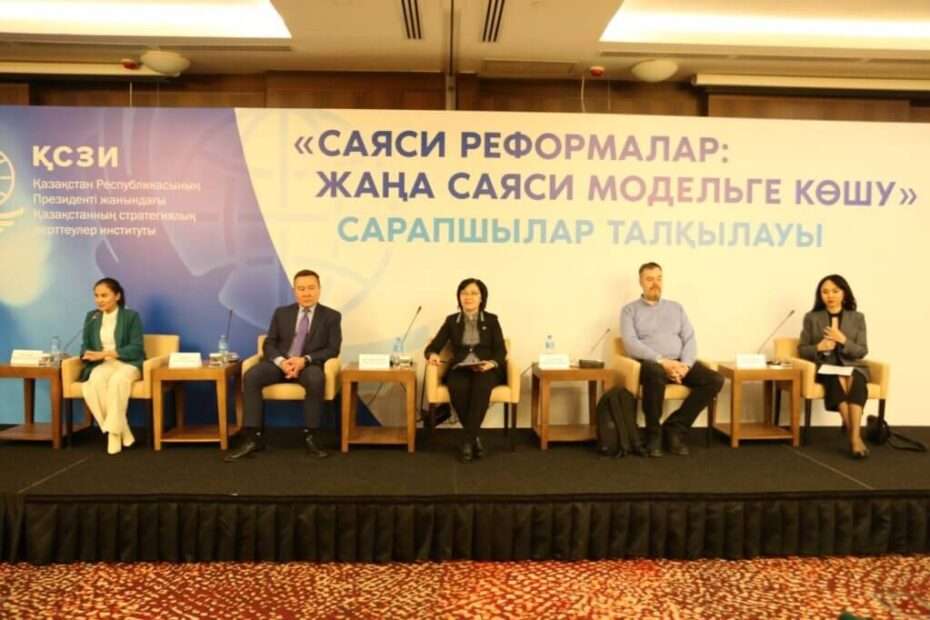On the 14th of March, 2023 expert discussion on the theme: “Political reforms: transition to a new political model” was held by Kazakhstan Institute for Strategic Studies under the President of the Republic of Kazakhstan in Astana.
Participants of the event discussed the specifics and importance of the 2023 elections, gave an expert assessment of the impact on systemic changes, that occured within the framework of the implemented political reforms, as well as the political restructuring of Kazakhstan.
As experts noted, the current electoral period is one of the key elements of political transformation. Political reforms have become an incentive for the development of electoral culture and the growth of civic engagement in the country. This election campaign is going to be one of the stages of modernization of state institutes. The complex of political reforms affected all the levels of representative authority and created conditions for renewal of the entire system.
During the expert discussion, deputy of the director of the KazISS under the President of the RK Alua Zholdybalina focused on some of the aspects of implementation of political reforms.
“First of all, the new rules for the registration of political parties allowed us to create competitive terms for the emergence of new parties. And already, in accordance with legislative innovations, two new parties have appeared. Secondly, within the framework of this electoral cycle , the rights of citizens to be elected were realized. It became possible thanks to the introduction of direct elections of rural akims. And also the transition to a mixed electoral system, when each citizen received the right to vote and be elected to Parliament and maslikhats. Thirdly, it is the modernization of political institutions. And here we are talking not just about quantitative changes, but also about substantive changes in the composition and work of the Parliament and local maslikhats. And here an important innovation will be the institution of recall of deputies, which will definitely affect the work of the legislative body”,- A. Zholdybalina said.
In his turn, the director of the Institute of Ethnopolitical studies Talgat Kaliyev noted, that during these elections, a new social agreement between authorities and society has been built.
“All political forces and actors are involved – both new and more experienced. There is an exchange of views, which nevertheless remains constructive. We observe the principle of the evolution of political processes. Discussions on social networks suggest that high activity is expected, which may lead to a high turnout. At the same time, we need to learn how to vote, to absorb this electoral culture. For some of the voters, this will be their first voting experience. A whole generation has been born since the last elections, when the majority system was used. It is important to conduct work in its environment, to inform about how the elections are organized and what their results affect”, – T.Kaliyev said.
According to the director of the Center for Topical Studies “Alternative” Andrey Chebotaryev, the current parliamentary elections are unique.
“On the one hand, they are occasioned by the political reforms of 2020-2022, including the adoption of well-known amendments to the Constitution of the RK and the law on elections. On the other hand, these elections themselves set the pace for a new stage of reforming the political system of Kazakhstan. In the first case, thanks to these reforms, parliamentary elections are held according to a mixed electoral system. At the same time, there is a high level of competition in single-mandate electoral districts, despite the fact that there are only 29 corresponding deputy mandates. In turn, this means the promotion of new ideas and the diversity of the political and information agenda. In the second case, the formation of new Majilis of Parliament and maslikhats at all levels will make it possible to take a number of important measures in the interests of the development of the country and its regions. In particular, from the previous convocation of the Mazhilis, draft laws on local self-government and on public control will be passed to future parliamentarians for consideration. They also face the task of legislative support for the implementation of the presidential election program with a large amount of socio-economic measures,” the speaker stressed.
Political scientist Zhanar Tulindinova believes that the current election campaign was able to refute skepticism about political reforms.
“Of course, the topic of today’s expert discussion is extremely topical. We are on the threshold of elections, there are only a few days left. This election campaign refuted the skepticism that has always been present when it came to political reforms. It can be said that the introduction of a mixed system and the opportunity to run in single–mandate constituencies have increased the level of trust of citizens and given a significant impetus to the manifestation of civil and political activity of Kazakhstanis,” Zh.Tulindinova said.


